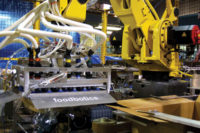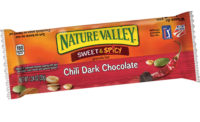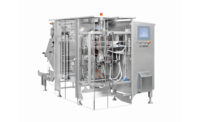Today’s scales and checkweighers address bakers & snack manufacturers changing packaging needs
While ease of use and sanitation are primary considerations for bakers and snack producers when selecting a scale or checkweigher, new package sizes and the need for data connectivity are also top of mind.
















Equipment manufacturers offering scales and checkweighers now offer systems that feature data connectivity, hygienic design, high speeds, improved accuracy, less waste and the ability to maintain traceability. And in addition to all these improvements, today’s scales and checkweighers are easier to use than earlier models.
Weighing-in on challenges
“Bakers and snack producers are telling us they need easy-to-use, open weighing systems that they can configure, integrate and maintain themselves,” says Rodger Jeffery, director of business development and marketing, Hardy Process Solutions, San Diego. “They don’t want ‘black box’ solutions that require specialists to upgrade or modify.”
Checkweighers that provide both accuracy and high readability are essential in the food packaging process. The weight of a product package must match the specifications listed on the product label. Even the smallest variation in portion size from that stated on the package means the product’s nutrition information could be inaccurate.
“Because some consumers have special diet requirements or restrictions, providing the wrong information could cause health problems for them and legal issues for the production plant,” says Tom Storey, director of marketing, Adam Equipment Co., Oxford, CT. “Laws are in place that require correct labeling of all food products, and that means the actual product weight must correspond with what’s on the label.”
Lightweight snacks, such as puffed or extruded snacks, can also require more vigilance on the part of bakers and snack producers. “As production goes up, weighing lighter snack products becomes more important,” says Rick Cash, product manager, checkweighers, Thermo Fisher Scientific Inc., Minneapolis. “Accuracy at lower weight becomes more critical, as does reliable reject mechanisms that remove lighter packages without jamming. Line rates are increasing, which makes production delays even more expensive for food processors.”
Baked goods like cookies, crackers and thin pretzels are often fragile and subject to breakage. At the same time, single-serve packs of such products are growing in popularity among consumers.. “In order to keep up with production rates when packaging single-serve packs, high speeds are required,” explains Brian Kennedy, general manager, OEM sales, Yamato Dataweigh, Mequon, WI. “High-speed scales have traditionally required the product to move at high velocity through the scale, but the faster the product moves, the higher the breakage rate.
“Yamato has developed a solution to run fragile products at high speeds by using multiple product paths and by sequencing the discharges,” says Kennedy. “By keeping multiple combinations separated within the scale, we are able to keep the product velocity low, thus reducing breakage while achieving high packaging speeds.”
Due to ingredient dust particles, baking and snack environments can be abrasive, so checkweigher bearing surfaces must be able to withstand such wear. “We’re sometimes asked to customize our systems for these abrasive environments,” says Cash. “Bakery and snack environments also can be hot, which may require control cabinet cooling. These issues must be discussed with the manufacturer before beginning an installation.”
Easy cleaning is another must in food-processing environments. As a rule, bakeries and snack production facilities need durable scales and checkweighers with stainless steel pans that are easy to clean. “Grade 304 stainless steel is sturdy, long-lasting and rust-resistant, which is why we use it on our food scale pans,” Storey says. “IP65/IP66 ratings on scale components ensure various levels of protection against dust or water damage, which means those scales can withstand higher levels of water pressure during washdown.”
Scales and checkweighers are being designed to address food-safety regulations, as well. “The Food Safety Modernization Act shifts the onus on manufacturers from being reactive to proactive, expanding their responsibilities regarding testing, documentation and auditing procedures,” Jeffery notes. “Oversight and management of preventive controls related to monitoring and verification are likely to create opportunities for manufacturers to help food processors meet food-safety obligations.”
The latest innovations
Data connectivity is one important feature of the latest weighing systems. CPM Beta Raven, St. Charles, MO, offers the Loss-in-Weight Scale System, which provides a constant online inventory monitor that alerts the operator of deviations. A batch controller SQL database imports production orders and exports the batch data once complete.
“A lid-lock option allows the operator to scan an ingredient bag, so that the system only allows the assigned ingredient bin to open,” says Steve Buehne, sales engineer, CPM Beta Raven. “This prevents the wrong ingredient from going into the wrong bin and provides a log of all ingredient transactions. If the lot number is included in the barcode, it also is logged in the transaction.”
Doran Scales Inc., Batavia, IL, offers the Selecta In-Motion Weighing System, a high-speed in-line checkweigher that addresses the growing trend toward data integration. The Selecta can be connected to a computer network with a wired Ethernet (included) or optional Wi-Fi connection.
“We’ve taken it one step further and developed software specifically for this new scale system that will allow plant management to gather production data from the scale and configure the scale from any PC on the network,” says Mark Podl, CEO, Doran Scales. “The scale operator can view product QC statistics on a 10.4-inch color touchscreen interface, which can be used to enter product QC tolerances and price lookup (PLU) data.”
The Ishida DACS-G line of checkweighers from Heat and Control Inc., Hayward, CA, features real-time data collection. Weighing data can be saved and managed on a PC. This not only allows manufacturers to check production status from a remote location, it means they can collect and analyze weighing data to improve productivity of the entire line, according to the company. Available in washdown and non-washdown applications, the stainless steel checkweighers handle items ranging from 6 grams to 60,000 grams.
The PrimoCombi 360 multi-head weigher from WeighPack Systems Inc., Montreal, is an open-frame combination scale featuring an electrical enclosure that can be positioned away from the scale, eliminating potential washdown hazards. The system comes with single-discharge chutes for increased production output and a single hopper assembly that enables manufacturers to adjust product inflow.
“The PrimoCombi 360 includes a 15-inch color touchscreen with a Windows operating system that is easily configurable to any enterprise resource planning (ERP)/material requirements planning (MRP) system. It includes features such as remote access, production reporting, scheduling and customizable languages,” says Nicholas Taraborelli, vice president of sales, WeighPack Systems.
Thermo Fisher Scientific’s fixed-height Global VersaWeigh checkweigher and the cantilevered Thermo Scientific Global Versa GP checkweigher feature a powered weigh table design. “Information such as detection events is displayed on both controller screens,” says Cash. “This gives the plant operators one less thing to worry about during line changeover. It also helps quality managers because all detection events on the metal detector are recorded in checkweigher reports.”
Yamato Dataweigh has partnered with Fortress Technology to develop the I-Series Checkweigher/Metal Detector Combo System. It reportedly features a common, robust frame with tubular legs and open-frame technology for easy cleaning. The shared frame reduces the overall system footprint, thus using less floor space.
Adam Equipment Co. says its Astro compact portioning scale is suitable for weighing snack-sized portions and measuring ingredients when making large batches in food-processing facilities. During packaging, individual servings can be weighed to ensure that they conform to size requirements, which helps operators minimize unexpected fluctuations in production costs.
Looking ahead
Scale and checkweigher manufacturers that supply the bakery and snack industries see single-serve, multichamber trays as an emerging trend, which may impact some companies. “Most of these packs have small target weights and require filling multiple trays simultaneously,” Kennedy notes. “This requires scales that are split (with multiple points of discharge) or require a depositor installed between the scale and the tray/cup line. Yamato offers scale options with multiple point discharges. With the addition of the Yamato depositor, pack patterns up to 6 inches by 6 inches can be created.”
Bakers and snack producers currently have many options to weigh when selecting scales and checkweighers—and manufacturers of these tools will continue to offer more as market trends change.
Looking for a reprint of this article?
From high-res PDFs to custom plaques, order your copy today!













